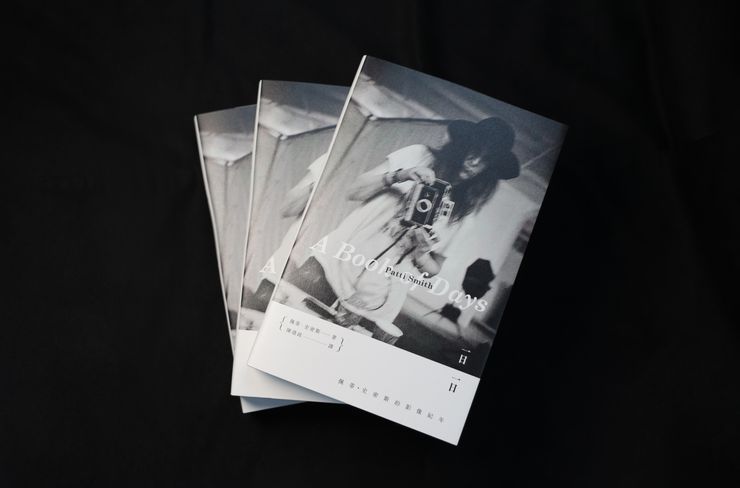Affected by the epidemic in the past three years, "punk poet laureate" Patti Smith can only be locked in the room to create, share life and artistic feelings with fans through Instagram. She also used the concept of "social media posts" to publish her latest book A Book of Days.
After the publication of the book, Patti accepted the first written interview by well-known Taiwanese musician Ma Shifang, generously recommending his favorite music albums and Asian literature. Ma Shifang was moved and decided to translate it herself, and shared it with readers at the 2023 Taipei International Book Exhibition. For details, see the full text of the interview below.

Q1:Here you are, 76 and still going strong. You said you see your life now "like a book that keeps expanding." What’s the most important things you've learned about aging? What keeps you still curious, eager to work, not afraid to break new grounds?
A1: The first thing is simply I am glad to be alive. Grateful that with each breath, each new day I can learn or produce something new. The work of others excites and inspires me. But also a new idea, which can be sparked by anything.
in turns of aging we should embrace it. Cultivate our inner self and appreciate what we have. Take care of ourselves, listen to our body's needs. Staying active and engaged in new things, new adventures (even small ones) keeps our spirit young.Q2: To make music, you have to work with other people, it's almost always a collaborating effort, together trying to capture and reshape what you hear in your head. On the other hand, writing a book is mostly a one-person journey, you are on your own until the very end of the working process. They are different ways to explore one's inner landscape. Do you feel you have to "switch" to a certain mode, or mindset, to make new music? What is the most difficult and demanding part of writing a book, and making music?
A2: I am more of a writer than a musician or songwriter. I tend to work in solitude and independently. Writing songs is a more collaborative effort and I find it fulfilling but more challenging. The most demanding part of writing a book is the intense amount of discipline required. And trying to get through periods where it feels impossible to write, when the words do not come. In these periods I have to maintain my faith that I will get through it and the writing will come back. And it always does!
Q3: You setup your own Instagram account taking your daughter's advice, and so we have this beautiful book. Me and a million followers all owe her a debt of thanks! Your children have been in the band for quite a few years now, what did you learn from them since you started performing and making music together?
A3: My son and daughter both inherit their late father's musicianship. When we perform together I can sense aspects from him and myself. Music draws us close and also keeps their father's spirit with us. I have learned how to maneuver our technically driven new century through them and to have a sense of the trials and hopes of younger generations. My daughter is a climate change activist and I have developed a much more evolved understanding of our role in climate change and how we can contribute to protecting the earth.
Q4: I'd like to know how this book affected your life, and what's the other books on the "must read before 21" list? When it comes to music, what is the album you think everyone should listen to before the age of 21?
A4: I read the book when I was seven, struggling with ideas about right and wrong. When I felt an internal rebellion. Pinocchio's journey projected a path of positive and negative possibilities. The book seems a metaphor of the human journey, all the sparring traits of what it means to be wholly human. The puppet experiences an awakening to the world. He is curious, enthusiastic and loved but also inexperienced, naïve and drawn to misadventure. The story is one of evolution and choice. He makes bad decisions. He lies, he runs away, he avoids responsibility but he also develops a conscience. In the end he sacrifices his life, the most profound act of love. Within love and sacrifice he is granted life. It is a book that offers redemption.
Music…It is impossible to choose. But I would pick A Love Supreme by John Coltrane, Electric Ladyland by The Jimi Hendrix Experience and What's Going On by Marvin Gaye. These three albums offer spiritual, political and poetical substance and sustenance. Spiritual food for thought.
Q5: You read a lot of Japanese literature: Murakami, Mishima, Akutagawa, Dazai… are you into any other Asian writers?
A5: I was drawn to Japanese literature in my early twenties. I read The Pillow Book and early writers, then discovered the Twentieth Century writers, partially through their connection with French literature. I think Akutagawa is my favorite. I have read early Chinese literature and the works of Mo Yan. I will continue to explore. Perhaps you and your readers have suggestions of authors for me to read.
About Shifang Ma
Shifang Ma is a writer, critic, and experienced radio host from Taiwan.
About Patti Smith
Patti Smith is the author of the National Book Award winner Just Kids, as well as M Train, Year of the Monkey, and numerous collections of poetry and essays. Her seminal album Horses has been hailed as one of the top 100 albums of all time. In 2005, the French Ministry of Culture awarded Smith the title of Commandeur des Arts et des Lettres; she was inducted into the Rock and Roll Hall of Fame in 2007, and was awarded the key to New York City in 2021.
Full Article in Traditional Chinese
「一切事物都可能觸發靈感。」──馬世芳專訪《一日一日》作者佩蒂.史密斯-\ 本月大人物 /-OKAPI閱讀生活誌
























